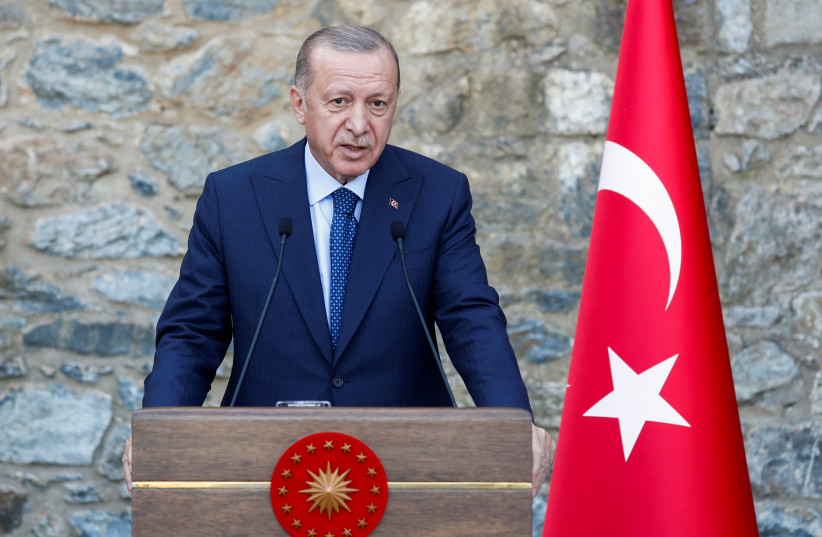Prime Minister Naftali Bennett plans to proceed cautiously when it comes to the possibility of warming ties with Ankara, after Turkish President Recep Tayyip Erdogan repeatedly expressed hope for a rapprochement.
“The prime minister has said that, especially after the Oaknins affair, we should take it slowly and we’ll see. No decision has been made but there are ongoing discussions,” a senior diplomatic source said, referring to the Israeli tourists arrested last month for photographing Erdogan’s Istanbul palace and freed a week later after a flurry of Israeli diplomatic activity.
Bennett and Foreign Minister Yair Lapid agreed that responding quickly and eagerly to Erdogan’s recent overtures could create the impression that they are susceptible to pressure or even a kind of blackmail, in the form of the Oaknins’ arrest and subsequent release after contacts between senior Turkish and Israeli officials, the source said.
Erdogan said on Wednesday that Jerusalem and Ankara can exchange ambassadors again if Israel changes course in areas Turkey views as red flags, referring specifically to Jerusalem and al-Aqsa Mosque, the Daily Sabah reported.
“I’ve had talks with Israel in the past but Israel needs to act more sensitively regarding its regional policies on Palestine,” Erdogan said.

The Turkish president responded to a question about Israel and Egypt in a press conference last week: “Whatever kind of step was taken with the UAE” to improve relations recently, “we will also take similar ones with the others.”
After Turkey released Natali and Mordy Oaknin, Erdogan held a rare phone call with Bennett and a call with President Isaac Herzog, only the second in several months.
“Differences of opinion can be minimized if acted upon with mutual understanding in both bilateral and regional issues,” the Turkish readout of the Erdogan-Herzog call stated.
There are differences of opinion between those who have Bennett’s ear on the topic of ties with Turkey.
Israel has developed close ties with Greece and Cyprus, Turkey’s historic adversaries, with an emphasis on energy and defense. Israel, Greece and Cyprus have worked on developing natural gas fields, and Turkish warships have warned Israeli ships out of Cyprus’s waters.
Greek Prime Minister Kyriakos Mitsotakis and Cypriot President Nicos Anastasiades spoke out against Turkey in their public statements in Jerusalem this week.
They criticized Ankara for opening access to Varosha, which had been a no-man’s-land between Cyprus and the Turkish-occupied North, and for encroaching on Greece and Cyprus’s economic waters – a topic on which Israel issued a rare statement taking Athen’s side in the dispute.
Anastasiades said his country has been “long subjected to behavior by our neighbor Turkey, which runs counter to international law.”
Mitsotakis warned that its behavior was an “unacceptable provocation.”
BENNETT VIEWS Israel’s close ties with Greece and Turkey as “one of the things the previous government did that we are happy to continue,” the source said, emphasizing the EastMed natural gas pipeline as an important initiative.
“We talk about Iran obsessively, and they’re the same with Turkey. That’s what they’re stressed about. And diplomatic relationships require some loyalty,” the senior diplomatic source stated.
In addition, many Israeli officials don’t trust Erdogan’s intentions.
At the same time, some of those advising Bennett say improving relations with Turkey is of strategic importance.
“No one is saying to have super-warm ties,” the source explained, “but maybe we could raise the temperature a bit. It’s a dilemma.”
Erdogan’s repeated overtures toward Israel in the past year could be part of his attempts to break Turkey out of a growing isolation due to his diplomatic feuds with many across the region, in order to improve his country’s economy. His meeting with United Arab Emirates’ leader Crown Prince of Abu Dhabi Sheikh Mohammed bin Zayed last week was followed with a plan for the UAE to invest $10 billion in Turkey, after years of discord between the countries.
Ankara may also be trying to get in on the natural gas developments in the region, or to repair bad relations between Erdogan and US President Joe Biden, who has called him an autocrat.
POOR RELATIONS between Israel and Turkey go as far back as 2008, when Israel launched Operation Cast Lead two days after Erdogan met with then-prime minister Ehud Olmert, embarrassing the latter, who did not want to be seen as complicit.
Ties hit a low point in 2010, when the Erdogan-linked IHH (Humanitarian Relief Foundation) sent the Mavi Marmara ship to bust the IDF’s naval blockade on Gaza, arming some of the people aboard. IDF naval commandos stopped the ship, were attacked by IHH members aboard, and killed nine of them.
Over the ensuing decade, Israel and Turkey maintained diplomatic relations, even reinstalling ambassadors in 2016, but over the years, Erdogan harbored Hamas terrorists, backed destabilizing activities in east Jerusalem and accused Israel of intentionally killing Palestinian children.
In 2018, Turkey expelled Israeli Ambassador Eitan Na’eh – now Israel’s envoy to Bahrain – in protest of the IDF’s response to Palestinian rioting on the Gaza border, and Israel responded in kind.
Last December, Erdogan was reported to have chosen Ufuk Ulutas, 40, a pro-Palestinian academic who studied at the Hebrew University of Jerusalem, to be his ambassador to Israel, though he never presented credentials in Jerusalem.
“Our heart desires that we can move our relations with [Israel] to a better point,” Erdogan said soon after, adding that intelligence sharing between the countries has always been intact. However, the president said that “We have some difficulties with the people at the top” and Ankara “cannot accept the attitude of Israel toward the Palestinian lands.”
